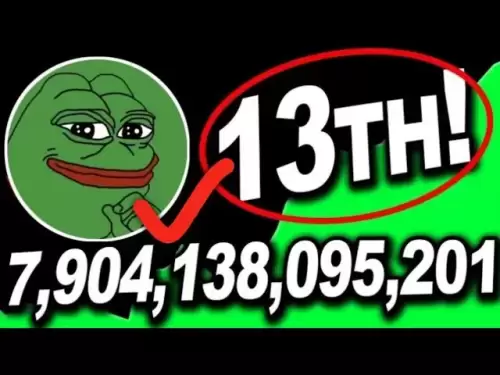-
 Bitcoin
Bitcoin $106,754.6083
1.33% -
 Ethereum
Ethereum $2,625.8249
3.80% -
 Tether USDt
Tether USDt $1.0001
-0.03% -
 XRP
XRP $2.1891
1.67% -
 BNB
BNB $654.5220
0.66% -
 Solana
Solana $156.9428
7.28% -
 USDC
USDC $0.9998
0.00% -
 Dogecoin
Dogecoin $0.1780
1.14% -
 TRON
TRON $0.2706
-0.16% -
 Cardano
Cardano $0.6470
2.77% -
 Hyperliquid
Hyperliquid $44.6467
10.24% -
 Sui
Sui $3.1128
3.86% -
 Bitcoin Cash
Bitcoin Cash $455.7646
3.00% -
 Chainlink
Chainlink $13.6858
4.08% -
 UNUS SED LEO
UNUS SED LEO $9.2682
0.21% -
 Avalanche
Avalanche $19.7433
3.79% -
 Stellar
Stellar $0.2616
1.64% -
 Toncoin
Toncoin $3.0222
2.19% -
 Shiba Inu
Shiba Inu $0.0...01220
1.49% -
 Hedera
Hedera $0.1580
2.75% -
 Litecoin
Litecoin $87.4964
2.29% -
 Polkadot
Polkadot $3.8958
3.05% -
 Ethena USDe
Ethena USDe $1.0000
-0.04% -
 Monero
Monero $317.2263
0.26% -
 Bitget Token
Bitget Token $4.5985
1.68% -
 Dai
Dai $0.9999
0.00% -
 Pepe
Pepe $0.0...01140
2.44% -
 Uniswap
Uniswap $7.6065
5.29% -
 Pi
Pi $0.6042
-2.00% -
 Aave
Aave $289.6343
6.02%
How to use Exodus for asset management?
Exodus offers user-friendly crypto asset management, from easy setup and sending/receiving to advanced features like staking and swapping. Secure your 12-word seed phrase; it's crucial for wallet recovery.
Mar 11, 2025 at 11:56 pm
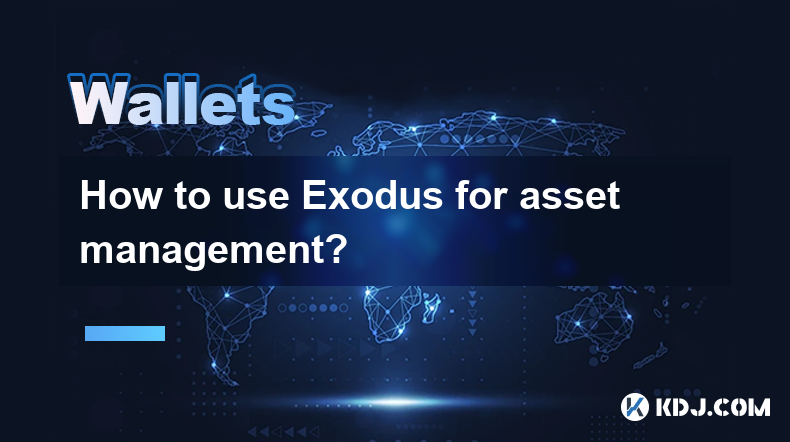
Key Points:
- Exodus is a user-friendly wallet supporting a wide range of cryptocurrencies. Asset management involves tracking, securing, and potentially trading your holdings.
- Setting up an Exodus wallet is straightforward, requiring only a download and password creation. Security features like seed phrases are crucial to understand.
- Exodus facilitates straightforward sending and receiving of cryptocurrencies, but understanding transaction fees is vital.
- Advanced features like staking and swapping are available within the Exodus ecosystem, offering additional asset management capabilities.
- Regularly backing up your seed phrase and practicing good security hygiene are paramount for effective asset management.
How to Use Exodus for Asset Management
Exodus is a popular cryptocurrency wallet known for its user-friendly interface and broad support for various digital assets. Effective asset management using Exodus involves several key steps, from initial setup to advanced features.
Setting Up Your Exodus Wallet:
First, download the Exodus wallet application from their official website. Ensure you download from the correct source to avoid malicious software. After installation, create a strong, unique password. Remember, this password protects your access to the wallet. You'll then be presented with your 12-word seed phrase – this is crucial. Write it down on paper and store it securely in a safe place, offline. This seed phrase allows you to recover your wallet if you lose access.
Adding Cryptocurrencies:
Exodus supports a large number of cryptocurrencies. To add a supported asset, simply search for it within the Exodus interface. Once you find it, you can view its current price and market information directly within the wallet. Remember to only add cryptocurrencies you understand and have researched.
Sending and Receiving Cryptocurrencies:
Sending and receiving cryptocurrencies through Exodus is relatively simple. For sending, you'll need the recipient's wallet address and the amount of cryptocurrency you want to send. Double-check all information before confirming the transaction. Receiving cryptocurrency is even easier; simply provide your Exodus wallet address to the sender.
Understanding transaction fees is essential. These fees vary depending on the network and the cryptocurrency. Exodus will display the fee before you confirm any transaction.
Advanced Asset Management Features in Exodus:
Exodus offers several advanced features to enhance your asset management capabilities.
- Staking: Some cryptocurrencies allow you to earn rewards by staking them. Exodus supports staking for several coins, providing a passive income stream. The process usually involves locking up your coins for a period. Understand the terms and conditions before committing your assets.
- Swapping: Exodus allows you to swap one cryptocurrency for another directly within the wallet. This simplifies trading and reduces the need for external exchanges. However, always be aware of potential slippage and fees associated with swaps.
- Portfolio Tracking: Exodus provides a clear overview of your entire cryptocurrency portfolio, displaying the value of each asset and your overall portfolio balance. This makes it easy to track your gains and losses.
Security Best Practices:
Security is paramount when managing your cryptocurrency assets.
- Seed Phrase Security: Never share your seed phrase with anyone. Losing your seed phrase means losing access to your funds. Consider using a hardware wallet for enhanced security if you are holding significant amounts of cryptocurrency.
- Software Updates: Regularly update your Exodus wallet to benefit from the latest security patches and improvements.
- Password Management: Use a strong, unique password for your Exodus wallet and never reuse it for other accounts.
- Two-Factor Authentication (2FA): Enable 2FA if available to add an extra layer of security to your account. This typically involves using an authenticator app to verify logins.
Frequently Asked Questions:
Q: Is Exodus a safe wallet?
A: Exodus employs robust security measures, but like all software wallets, it's not immune to vulnerabilities. Practicing good security habits, such as securing your seed phrase and regularly updating the software, is crucial.
Q: What cryptocurrencies does Exodus support?
A: Exodus supports a wide range of cryptocurrencies. You can check their official website for the most up-to-date list of supported assets. This list is regularly updated.
Q: How do I recover my Exodus wallet if I lose my password?
A: You can recover your wallet using your 12-word seed phrase. This is why keeping your seed phrase safe and secure is so important.
Q: Are there fees for using Exodus?
A: Exodus itself doesn't charge fees for its services. However, network fees are applicable when sending or receiving cryptocurrencies. These fees are determined by the blockchain network and vary depending on factors such as network congestion.
Q: Can I use Exodus on multiple devices?
A: You can access your Exodus wallet on multiple devices, but remember that your seed phrase will grant access from any device. Therefore, maintaining the security of your seed phrase is crucial regardless of the number of devices you use.
Q: What is the difference between Exodus and other cryptocurrency wallets?
A: Exodus differentiates itself through its user-friendly interface, broad cryptocurrency support, and built-in features like staking and swapping. Other wallets may focus on specific features or security models, leading to varying levels of user experience and security.
Disclaimer:info@kdj.com
The information provided is not trading advice. kdj.com does not assume any responsibility for any investments made based on the information provided in this article. Cryptocurrencies are highly volatile and it is highly recommended that you invest with caution after thorough research!
If you believe that the content used on this website infringes your copyright, please contact us immediately (info@kdj.com) and we will delete it promptly.
- 2025-W Uncirculated American Gold Eagle and Dr. Vera Rubin Quarter Mark New Products
- 2025-06-13 06:25:13
- Ruvi AI (RVU) Leverages Blockchain and Artificial Intelligence to Disrupt Marketing, Entertainment, and Finance
- 2025-06-13 07:05:12
- H100 Group AB Raises 101 Million SEK (Approximately $10.6 Million) to Bolster Bitcoin Reserves
- 2025-06-13 06:25:13
- Galaxy Digital CEO Mike Novogratz Says Bitcoin Will Replace Gold and Go to $1,000,000
- 2025-06-13 06:45:13
- Trust Wallet Token (TWT) Price Drops 5.7% as RWA Integration Plans Ignite Excitement
- 2025-06-13 06:45:13
- Ethereum (ETH) Is in the Second Phase of a Three-Stage Market Cycle
- 2025-06-13 07:25:13
Related knowledge
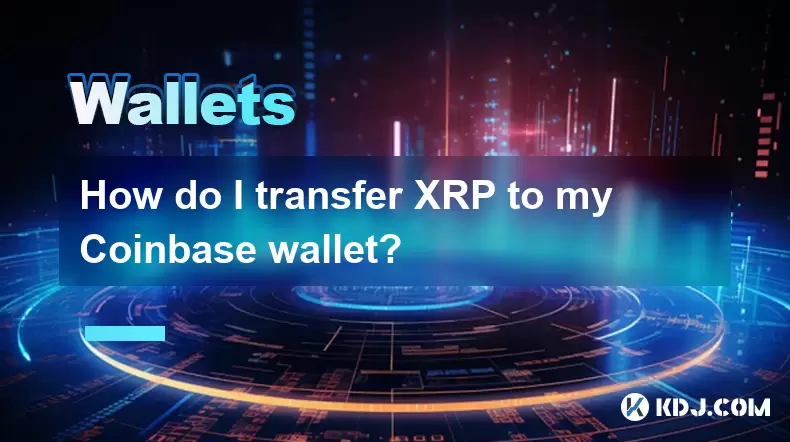
How do I transfer XRP to my Coinbase wallet?
Jun 16,2025 at 04:57pm
Understanding the Basics of XRP and Coinbase CompatibilityBefore initiating any transfer, it’s essential to confirm whether Coinbase supports XRP. As of recent updates, Coinbase has resumed offering XRP trading services on its platform after a period of uncertainty due to legal issues involving Ripple Labs. However, availability may vary depending on yo...

How do I deposit BNB into my Trust Wallet?
Jun 15,2025 at 03:56pm
Understanding BNB and Trust Wallet CompatibilityBefore initiating a deposit, it’s crucial to understand what BNB is and how it interacts with Trust Wallet. BNB (Binance Coin) is a utility token created by the Binance exchange. It can be used for paying transaction fees, participating in token sales, and more. Trust Wallet, on the other hand, is a mobile...
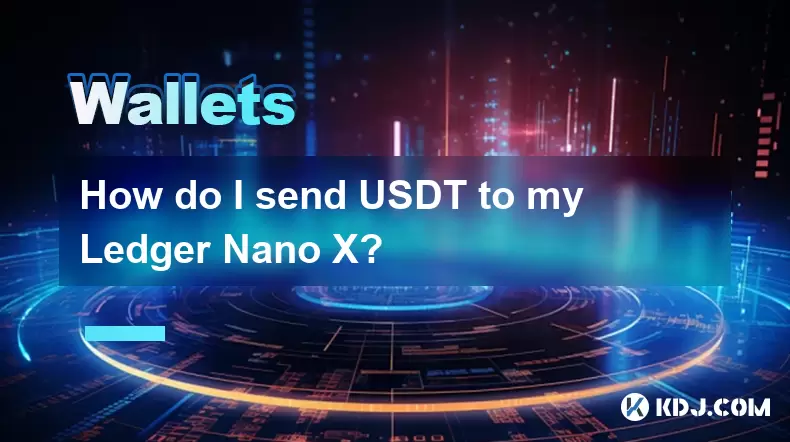
How do I send USDT to my Ledger Nano X?
Jun 15,2025 at 06:28am
What is USDT and Why Use Ledger Nano X?USDT, also known as Tether, is one of the most widely used stablecoins in the cryptocurrency ecosystem. It operates on various blockchain networks such as Ethereum (ERC-20), Tron (TRC-20), and others, offering users a digital asset pegged 1:1 to the US dollar. When it comes to storing USDT securely, hardware wallet...
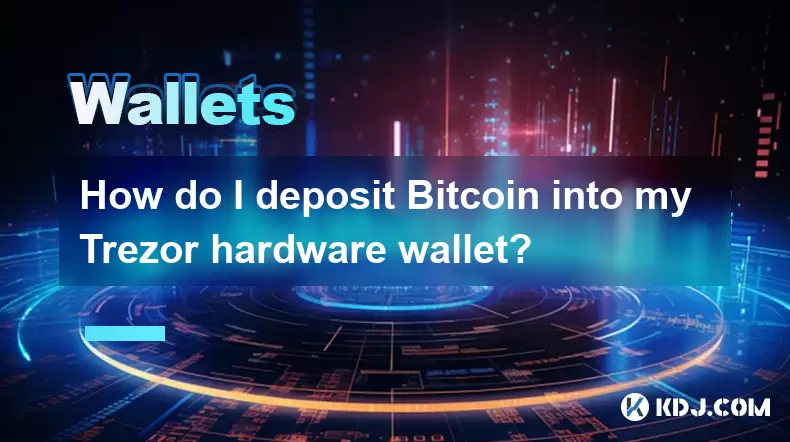
How do I deposit Bitcoin into my Trezor hardware wallet?
Jun 14,2025 at 12:29pm
What is a Trezor Hardware Wallet?A Trezor hardware wallet is a secure device designed to store cryptocurrencies offline, protecting them from online threats. Unlike software wallets, which are vulnerable to hacking and malware, Trezor stores private keys on the physical device itself. This ensures that transactions can only be approved by physically int...
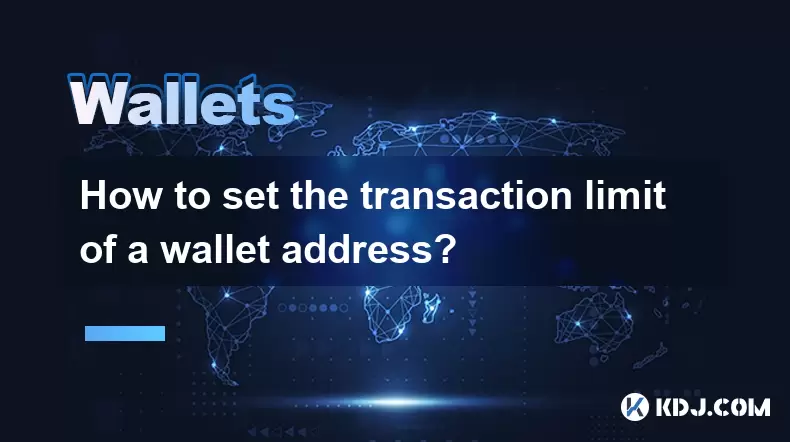
How to set the transaction limit of a wallet address?
Jun 16,2025 at 04:08am
Understanding the Concept of Transaction Limits in Cryptocurrency WalletsIn the cryptocurrency ecosystem, transaction limits refer to predefined restrictions placed on the amount of digital assets that can be sent or received by a wallet address within a specified timeframe. These limits are typically enforced by platforms such as exchanges, custodial w...
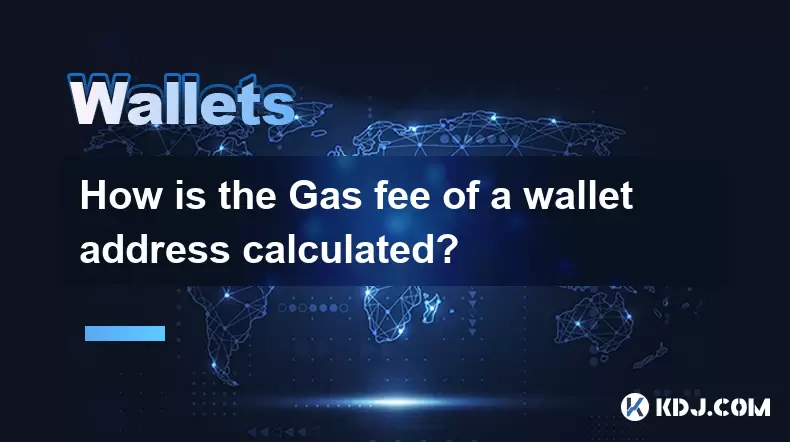
How is the Gas fee of a wallet address calculated?
Jun 14,2025 at 07:57pm
Understanding the Basics of Gas Fees in Blockchain TransactionsIn the cryptocurrency ecosystem, particularly within Ethereum-based networks, a Gas fee is an essential component of executing transactions or smart contract operations. The Gas fee serves as compensation for miners or validators who process and confirm transactions on the blockchain. It is ...

How do I transfer XRP to my Coinbase wallet?
Jun 16,2025 at 04:57pm
Understanding the Basics of XRP and Coinbase CompatibilityBefore initiating any transfer, it’s essential to confirm whether Coinbase supports XRP. As of recent updates, Coinbase has resumed offering XRP trading services on its platform after a period of uncertainty due to legal issues involving Ripple Labs. However, availability may vary depending on yo...

How do I deposit BNB into my Trust Wallet?
Jun 15,2025 at 03:56pm
Understanding BNB and Trust Wallet CompatibilityBefore initiating a deposit, it’s crucial to understand what BNB is and how it interacts with Trust Wallet. BNB (Binance Coin) is a utility token created by the Binance exchange. It can be used for paying transaction fees, participating in token sales, and more. Trust Wallet, on the other hand, is a mobile...

How do I send USDT to my Ledger Nano X?
Jun 15,2025 at 06:28am
What is USDT and Why Use Ledger Nano X?USDT, also known as Tether, is one of the most widely used stablecoins in the cryptocurrency ecosystem. It operates on various blockchain networks such as Ethereum (ERC-20), Tron (TRC-20), and others, offering users a digital asset pegged 1:1 to the US dollar. When it comes to storing USDT securely, hardware wallet...

How do I deposit Bitcoin into my Trezor hardware wallet?
Jun 14,2025 at 12:29pm
What is a Trezor Hardware Wallet?A Trezor hardware wallet is a secure device designed to store cryptocurrencies offline, protecting them from online threats. Unlike software wallets, which are vulnerable to hacking and malware, Trezor stores private keys on the physical device itself. This ensures that transactions can only be approved by physically int...

How to set the transaction limit of a wallet address?
Jun 16,2025 at 04:08am
Understanding the Concept of Transaction Limits in Cryptocurrency WalletsIn the cryptocurrency ecosystem, transaction limits refer to predefined restrictions placed on the amount of digital assets that can be sent or received by a wallet address within a specified timeframe. These limits are typically enforced by platforms such as exchanges, custodial w...

How is the Gas fee of a wallet address calculated?
Jun 14,2025 at 07:57pm
Understanding the Basics of Gas Fees in Blockchain TransactionsIn the cryptocurrency ecosystem, particularly within Ethereum-based networks, a Gas fee is an essential component of executing transactions or smart contract operations. The Gas fee serves as compensation for miners or validators who process and confirm transactions on the blockchain. It is ...
See all articles

























